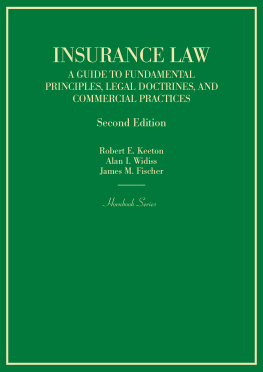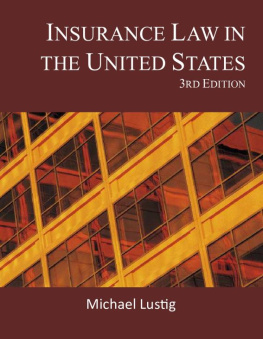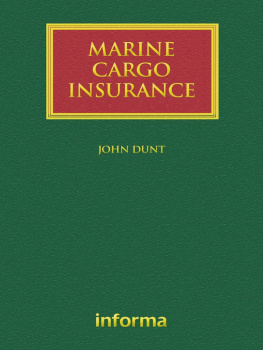West Academic Publishings Law School Advisory Board
JESSE H. CHOPER
Professor of Law and Dean Emeritus,
University of California, Berkeley
JOSHUA DRESSLER
Distinguished University Professor, Frank R. Strong Chair in Law
Michael E. Moritz College of Law, The Ohio State University
YALE KAMISAR
Professor of Law Emeritus, University of San Diego
Professor of Law Emeritus, University of Michigan
MARY KAY KANE
Professor of Law, Chancellor and Dean Emeritus,
University of California, Hastings College of the Law
LARRY D. KRAMER
President, William and Flora Hewlett Foundation
JONATHAN R. MACEY
Professor of Law, Yale Law School
ARTHUR R. MILLER
University Professor, New York University
Formerly Bruce Bromley Professor of Law, Harvard University
GRANT S. NELSON
Professor of Law, Pepperdine University
Professor of Law Emeritus, University of California, Los Angeles
A. BENJAMIN SPENCER
Earle K. Shawe Professor of Law,
University of Virginia School of Law
JAMES J. WHITE
Robert A. Sullivan Professor of Law Emeritus,
University of Michigan
INSURANCE LAW
A GUIDE TO FUNDAMENTAL PRINCIPLES, LEGAL DOCTRINES, AND COMMERCIAL PRACTICES
Second Edition
Robert E. Keeton
Langdell Professor Emeritus
Harvard University
Alan I. Widiss
Josephine R. Witte Professor of Law
University of Iowa
James M. Fischer
Professor of Law
Southwestern Law School
HORNBOOK SERIES

The publisher is not engaged in rendering legal or other professional advice, and this publication is not a substitute for the advice of an attorney. If you require legal or other expert advice, you should seek the services of a competent attorney or other professional.
Hornbook Series is a trademark registered in the U.S. Patent and Trademark Office.
COPYRIGHT 1988 By WEST PUBLISHING CO.
2017 LEG, Inc. d/b/a West Academic
444 Cedar Street, Suite 700
St. Paul, MN 55101
1-877-888-1330
West, West Academic Publishing, and West Academic are trademarks of West Publishing Corporation, used under license.
Printed in the United States of America
ISBN: 978-0-314-28917-9
Preface to the Second Edition
This text is designed to remain true to the view of insurance law espoused by the original authors, Robert Keeton and Alan Widiss. That view, as expressed on the initial preface, was to see insurance law as consisting of fundamental principles and legal doctrine around which the intricacies and complexities of insurance law could be examined and understood.
Insurance is crucial to modern American consumer and commercial life, yet few lawyers and judges appreciate the body of law that has developed to govern and control insurance transactions and disputes. Perhaps this is because insurance law is often perceived to be an arcane and difficult area of law. This book attempts to dispel that perception by showing and demonstrating that insurance law is based on several core concepts and principles, that once examined and understood open the subject to general comprehension.
It is to be expected that such a critical area of law would be the subject of numerous social, political, and cultural forces that would push the substance of insurance law in many different directions. Yet, it is the authors belief that, at its core, insurance law is subject to basic, fundamental principles and that identifying and understanding those basic, fundamental principles aids immeasurably in understanding the subject of insurance law.
The preparation of this Second Edition was made possible by the generous support of Dean Susan Prager and Southwestern Law School. The text preparation would not have been possible without the invaluable assistance of Melissa Agnetti, who provided research and assistance in corroborating the accuracy of the citations in this text.
Unfortunately, the original authors are no longer alive. I hope this Second Edition meets the exceptionally high standards they achieved in their original work published in 1988.
James M. Fischer
June, 2016
Preface to the First Edition
Insurance is one of the pervasive institutions of the twentieth century. The billions of dollars of insurance coverage and the very substantial number of different types of insurance currently in use in the United States mirror both the dimensions of the American economy and the diverse activities engaged in by individuals, corporate entities, the states, and the federal government.
The insurance law of this country encompasses literally hundreds of thousands of judicial decisions, legislative provisions, and administrative regulations. Moreover, the cumulative volume of these legal materials is increasing by a significant amount each year. The scope and variety of the matters encompassed within the field of insurance law require that the authors of any text on this subject make choices among the possible goals for the undertaking.
The objectives which guided the preparation of this text are very similar to those selected for the predecessor to this volume, Basic Text on Insurance Law by Professor Keeton. The primary goal continues to be a book that explicates the fundamental principles and legal doctrines that comprise the law of insurance. Each of the chapters has been designed with a view to facilitating an understanding and an appreciation of the significance of general principles and doctrines.
Although the objective is to provide a broad perspective on the topics which are being considered, in several instances a substantial portion of a chapter is devoted to the applications of the general principles or doctrines to specific types of insurance. Organizing the materials in this way facilitates an analysis of the reasons why general principles or doctrines are sometimes treated rather differently depending on the type of insurance which is involved. Furthermore, to attain a complete understanding, often it is also necessary to be aware of the commercial practices employed by insurers and the reasons for those practices.
The secondary objective which guided the development of this text was to include discussions of significant issues or problems which are repeatedly the subject of disputes, with a view both to examining the general principles that are relevant to these questions and to suggesting lines of analysis that should be considered when such matters must be addressed. The footnotes to the text in these sections include references to many judicial decisions and secondary sources. Although no attempt has been made to provide a comprehensive body of references, the items cited in footnotes will almost always lead the reader to the larger body of relevant materials.
Insurance disputes frequently involve concepts that have been developed in other areas of the law. Principles, doctrines, rules, and public policy concerns from contracts, procedure, property, and torts are often employed in the analysis of insurance law questions. Doctrines from constitutional law, corporations, and criminal law are also involved, though somewhat less frequently. Furthermore, the law student or lawyer who has studied administrative law, estate planning, or regulated industries will find that topics analyzed in each of those fields are relevant to issues that will be discussed in this text. However, one cautionary note should be stated: even though many concepts from other areas of the law are relevant to and have been incorporated into the body of insurance law, it is essential that these principles, doctrines, rules, and public policy interests be carefully reviewed and reconsidered when they are to be applied to questions that arise as a consequence of an insurance transaction.









